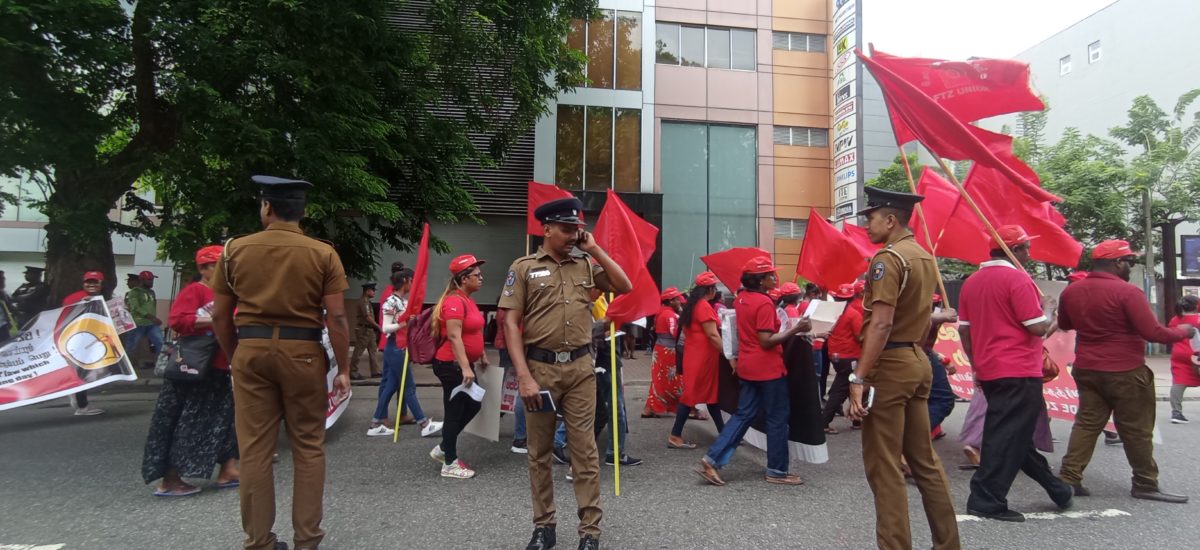Photo courtesy of Buwanaka S. Perera
The connection between May Day and labour rights began in the United States. During the 19th century, at the height of the industrial revolution, thousands of men, women and children were dying every year from poor working conditions and long hours. The world was moving out of the millennia long feudal systems, trying to see where the rights of workers and labourers fitted in. From children being used in cotton mills to workers dying from exhaustion in cast iron workshops and women being paid almost nothing in assembly lines, it was only a matter of time before the winds of change blew across the Western hemisphere.
In an attempt to end these inhumane conditions, the Federation of Organized Trades and Labor Unions (which would later become the American Federation of Labor) held a convention in Chicago in 1884. It proclaimed “eight hours shall constitute a legal day’s labor from and after May 1, 1886.”
With minimum regulations and safety nets, history stands witness as to how workers were exploited without remorse. The lack of education about May Day and the negligence of modern education in addressing crimes and issues of colonial industrialism has paved the way for Marxist governments to hijack that particular chapter in history for their benefit; exploit the workers in the name of the state,the Party and themselves.
While the country has not seen a Marxist/communist government take power, Sri Lanka has been struggling to find its footing between socialism and capitalism while the parties in power and the parties in opposition continue to shamelessly push their agendas under the sickle and hammer. This year’s May Day rallies organized by the political parties saw the Aragalaya and the struggles of the low income citizens being used and abused, turning them into election campaign spectacles.
Like every year, these parties used the May Day to gloat instead of celebrating the workers, the life force of our nation – the SLPP wanting to wash the Beira off itself while throwing one conspiracy theory after the other about destabilization, the SJB marching around Colombo complaining about what they couldn’t while in Sirikotha and the NPP flooding the Colombo Municipal Council premisesrepeating the term Aragalaya in a desperate attempt to hijack the struggles of the people. Another comparatively small, yet historic, rally was held in a stadium in Maligawatta with the participation of trade unionists from the North and North East, LGBTQ+ community, free trade zone workers, plantation workers, domestic workers, sex workers, fisherfolk, farmers and activists. A truly inclusive May Day rally that gave space for the workers and not the politicians. Shouldn’t May Day be the one day that the workers get to voice out their concerns and legislators listen to them? Instead they steal the day to repeat everything they say inside the parliament.
Speaking to Groundviews, one of the organizers of the joint trade union rally said, “This year’s May Day rally was organized to celebrate and highlight issues and concerns of working class people whose needs are ignored, save for political benefit. We want to send a clear message not just only to the government but all political parties. If they do not represent the people and act on their behalf, if they do not listen to our concerns, they will face the consequences.” He added that unlike the political parties that are divided, the trade unions were uniting like never before.
Addressing the rally, transgender activist Bhoomi Harendran said that this was the first time that the LGBTQ+ community and its contribution to the nation’s workforce and its economy has been acknowledged at a May Day rally. “It is a blessing to have myself and my community be a part of a non-partisan and independent May Day rally,” she said.
Following the Easter Sunday attacks, COVID-19 and the protests of 2022, Sri Lanka saw a sharp increase in its unemployment rate with the closure of many factories and businesses.”More than 40 factories and over 73,000 people lost their jobs and the only response the government has is that it’s an economic crisis. We want problem solvers not just problem identifiers,” said Anton Marcus, General Secretary of the Free Trade Zone and General Services Union.
While the true spirit of May Day has been lost in empty radical jargon, the demands, concerns and the celebration of workers was still alive in a corner of the city. But if workers and trade unions are continually undermined and oppressed, the hard won eight hour work days, minimum wages, pension schemes and health benefits will be things of the past.
So let us acknowledge the blood and sweat spilled by the workers beyond the marches, rallies, red caps and t-shirts – beyond just one day a year.

